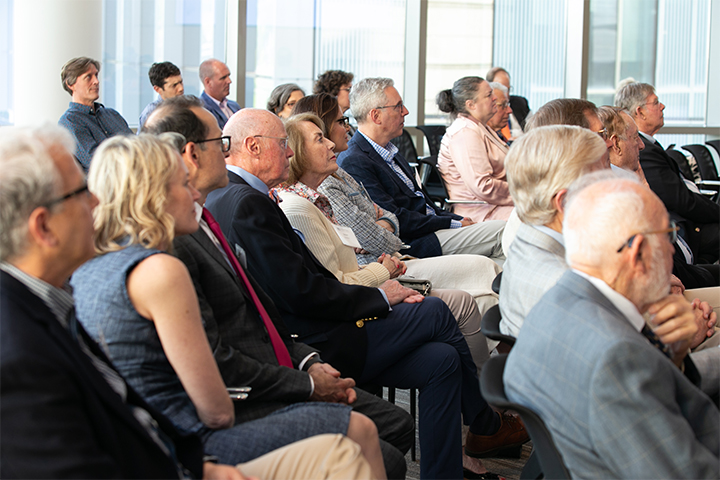Supporters of science take a ride on the gut highway
Annual Hudson Hoagland Society meeting explores the world of microbiome-driven health and disease
Date Posted: Thursday, June 13, 2024
Are we more microbial than human?
This thought-provoking question was posed at the 39th annual meeting of the Hudson Hoagland Society (HHS) held on May 14 at UMass Chan Medical School.
Consider this: Bacterial cells outnumber human body cells by a ratio of 10-1 and comprise four to six pounds of our own body mass. They live both in and on us, including our skin, upper respiratory tract, reproductive areas, ear canal, eyelids and the gastrointestinal (GI) tract, where 95 percent of our body’s microbes reside—100 trillion of them!

Beth A. McCormick, PhD, world-renowned microbiologist and GI physiologist, gave HHS members a fascinating glimpse into the emerging field of microbiome research during her presentation, “Navigating the Gut Highway: Insights Into Microbiome-Driven Health and Disease.” Dr. McCormick is the Worcester Foundation for Biomedical Research Chair II, professor and chair of the Department of Microbiology, and founding director of the UMass Center for Microbiome Research. She has studied many forms of interaction between gut microbes and the GI tract, with a special focus on cross-signaling and metabolomic interactions, and in particular multi-drug transporters.
As Dr. McCormick explained, colonization of the GI tract begins immediately after birth and is complete around age 18 to 24 months. Here, intestinal microbiota serve important protective, structural and metabolic functions. For example, keeping out pathogen intruders and producing antimicrobial factors.
As we get older, our microbiome communities undergo adaptations that are impacted by factors such as antibiotic treatments, lifestyle, diet and hygiene, with significant implications for our health. Dysbiosis, an unbalanced microbiome state that can occur as a result of these influences, correlates with numerous diseases such as inflammatory bowel disease (IBD), Alzheimer’s disease and type 2 diabetes.
At the UMass Center for Microbiome Research, Dr. McCormick and her team are gaining a better understanding of the biological effects of human microbial communities, with the purpose of developing microbiome-targeting therapeutics to prevent and treat disease. To advance discovery into practice, the team follows a model of learning from the bench, going to the bedside, and then coming back to the bench, while integrating clinical, experimental/biological and computational approaches.
Microbiome research is leading to real, potentially life-changing medical advancements. Dr. McCormick co-founded biotechnology company Adiso Therapeutics, based in part on her technology, which is advancing a promising first-in-class small molecule into phase 2a clinical trials for the treatment of ulcerative colitis, one of the most difficult forms of IBD. Additional therapeutics are in the pipeline.
Serving as moderator of the program, Thoru Pederson, PhD, the Vitold Arnett Professor of Cell Biology and professor of biochemistry & molecular biotechnology, facilitated an active question-and-answer session. Members of the Hudson Hoagland Society eagerly engaged with Dr. McCormick and members of the Center of Microbiome Research, probing deeper into the latest findings on microbiome interactions and their implications for human health. The session also highlighted the interdisciplinary nature of microbiome research, fostering a collaborative atmosphere as experts exchanged insights and discussed future directions for this rapidly evolving field.
Terence R. Flotte, MD, the Celia and Isaac Haidak Professor, executive deputy chancellor, provost and dean of the T.H. Chan School of Medicine, also offered an update on the Medical School, highlighting growth in the research enterprise, including a steady increase in National Institutes of Health funding and completion of the new, nine-story education and research building on the Worcester campus, as well as the election of Celia Schiffer, PhD, the Arthur F. and Helen P. Koskinas Professor of Biochemistry and Molecular Biotechnology and chair and professor of biochemistry & molecular biotechnology, to the National Academy of Sciences.
The firsthand scientific insights shared during the meeting reflect the core mission of the HHS, which was originally established in 1985 to recognize major annual contributors to the Worcester Foundation for Biomedical Research. The Worcester Foundation merged with UMass Chan in 1997.
Funds raised through the Hudson Hoagland Society are now used to support the most promising and innovative research at UMass Chan. These "seed" grants are awarded based on a competitive review process and allow the awardee to pursue new, innovative research.
2024 Worcester Foundation research grant recipients
The 2024 Worcester Foundation grant recipients and projects were announced at the meeting and include:
- Raquel Binder, PhD, MPH, Department of Medicine
“Zoonotic Coronavirus Transmission in the Democratic Republic of the Congo” - Elliot Edmiston, PhD, Department of Psychiatry, The Bassick Family Foundation Award
“Neural Correlates of Interoceptive Accuracy and Developmental Risk for Depressive and Anxiety Disorders During Puberty” - Michael Francis, PhD, Department of Neurobiology
“Defining the Impacts of Aging and Disease on the Postsynaptic Proteome” - Paul Kaufman, PhD, Department of Molecular, Cell and Cancer Biology
“Nuclear Body Formation During Pro-Inflammatory Macrophage Differentiation”
